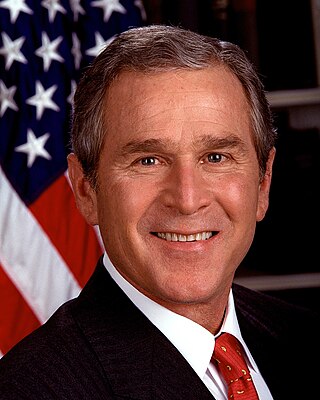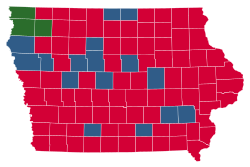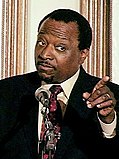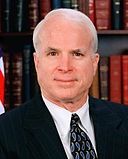
The presidential primary elections and caucuses held in the various states, the District of Columbia, and territories of the United States form part of the nominating process of candidates for United States presidential elections. The United States Constitution has never specified the process; political parties have developed their own procedures over time. Some states hold only primary elections, some hold only caucuses, and others use a combination of both. These primaries and caucuses are staggered, generally beginning sometime in January or February, and ending about mid-June before the general election in November. State and local governments run the primary elections, while caucuses are private events that are directly run by the political parties themselves. A state's primary election or caucus is usually an indirect election: instead of voters directly selecting a particular person running for president, they determine the number of delegates each party's national convention will receive from their respective state. These delegates then in turn select their party's presidential nominee. The first state in the United States to hold its presidential primary was North Dakota in 1912, following on Oregon's successful implementation of its system in 1910.

The 2008 United States presidential election was the 56th quadrennial presidential election, held on Tuesday, November 4, 2008. The Democratic ticket of Barack Obama, the junior senator from Illinois, and Joe Biden, the senior senator from Delaware, defeated the Republican ticket of John McCain, the senior senator from Arizona, and Sarah Palin, the governor of Alaska. Obama became the first African American to be elected to the presidency, as well as being only the third sitting United States senator elected president, joining Warren G. Harding and John F. Kennedy. Meanwhile, this was only the second successful all-Senator ticket since the 1960 election. This is the only election where both major party nominees were sitting Senators.

The Iowa caucuses are biennial electoral events for members of the Democratic and Republican parties in the U.S. state of Iowa. Unlike primary elections in most other U.S. states, where registered voters go to polling places to cast ballots, Iowans instead gather at local caucus meetings to discuss and vote on the candidates. During both the presidential and midterm election seasons, registered Iowan voters vote in a per-precinct caucus for the party of which they are registered as a member. The caucuses are also held to select delegates to county conventions and party committees, among other party activities.
The following is a timeline of major events leading up to and immediately following the United States presidential election of 2008. The election was the 56th quadrennial United States presidential election. It was held on November 4, 2008, but its significant events and background date back to about 2002. The Democratic Party nominee, Senator Barack Obama of Illinois, defeated the Republican Party's nominee, Senator John McCain of Arizona.

The 2008 Iowa Republican presidential caucuses took place on January 3, 2008. The Iowa Republican caucuses are an unofficial primary, with the delegates to the state convention selected proportionally via a straw poll. The Iowa caucuses mark the traditional formal start of the delegate selection process for the 2008 United States presidential election.

From January 3 to June 3, 2008, voters of the Republican Party chose their nominee for president in the 2008 United States presidential election. Senator John McCain of Arizona was selected as the nominee through a series of primary elections and caucuses culminating in the 2008 Republican National Convention held from Monday, September 1, through Thursday, September 4, 2008, in Saint Paul, Minnesota. President George W. Bush was ineligible to be elected to a third term due to the term limits established by the 22nd Amendment.

The Republican Party of Iowa (RPI) is the affiliate of the United States Republican Party in Iowa. The State Central Committee is chaired by Jeff Kaufmann. The RPI operates the Republican side of the Iowa caucuses and previously sponsored the Iowa Straw Poll.

The Iowa Straw Poll was a presidential straw poll and fundraising event for the Republican Party of Iowa. It was held six times, traditionally in late summer approximately six months in advance of contested presidential Iowa caucuses, from 1979 until 2011, on the campus of Iowa State University in Ames.

The 2008 United States presidential election in Iowa took place on November 4, 2008, as part of the 2008 United States presidential election. Voters chose seven representatives, or electors to the Electoral College, who voted for president and vice president.

The 2008 New Hampshire Republican presidential primary took place on January 8, 2008, with 12 national delegates being allocated proportionally to the popular vote.

The 2008 Nevada Republican presidential caucuses was held on January 19, the same day as the 2008 South Carolina Republican primary, with 31 delegates at stake. Mitt Romney was the winner in Nevada with 51% of the votes, with Ron Paul in second place. Half of Romney's votes came from Mormons, while two-thirds of the independent voters favored Paul. According to the Las Vegas Sun, Republicans crossed over in large numbers to vote Democratic; CNN exit polls indicated that Republican voters made up 4% of the Democratic caucus turnout.

From January 24 to June 6, 2000, voters of the Republican Party chose its nominee for president in the 2000 United States presidential election. Texas Governor George W. Bush was selected as the nominee through a series of primary elections and caucuses culminating in the 2000 Republican National Convention held from July 31 to August 3, 2000, in Philadelphia, Pennsylvania.
The following is a timeline of major events leading up to the United States presidential election of 2012. The election was the 57th quadrennial United States presidential election and was held on November 6, 2012.

Voters of the Republican Party elected state delegations to the 2012 Republican National Convention in presidential primaries. The national convention then selected its nominee to run for President of the United States in the 2012 presidential election. There were 2,286 delegates chosen, and a candidate needed to accumulate 1,144 delegate votes at the convention to win the nomination. The caucuses allocated delegates to the respective state delegations to the national convention, but the actual election of the delegates were, many times, at a later date. Delegates were elected in different ways that vary from state to state. They could be elected at local conventions, selected from slates submitted by the candidates, selected at committee meetings, or elected directly at the caucuses and primaries.

The 2012 United States presidential election in Iowa took place on November 6, 2012, as part of the 2012 United States presidential election in which all 50 states plus the District of Columbia participated. Iowa voters chose six electors to represent them in the Electoral College via a popular vote pitting incumbent Democratic President Barack Obama and his running mate, Vice President Joe Biden, against Republican challenger and former Massachusetts Governor Mitt Romney and his running mate, Congressman Paul Ryan.

The 2012 Iowa Republican presidential caucuses took place on January 3, 2012.

The 1996 Iowa Republican presidential caucuses were held on February 12, 1996. The Iowa Republican caucuses are an unofficial primary, with the delegates to the state convention selected proportionally via a straw poll. The Iowa caucuses marked the traditional formal start of the delegate selection process for the 1996 United States presidential election.

The 2008 United States presidential election in New Hampshire took place on November 4, 2008, as part of the 2008 United States presidential election throughout all 50 states and D.C. Voters chose four representatives, or electors to the Electoral College, who voted for president and vice president.

Presidential primaries and caucuses of the Republican Party took place within all 50 U.S. states, the District of Columbia, and five U.S. territories between February 1 and June 7, 2016. These elections selected the 2,472 delegates that were sent to the Republican National Convention. Businessman and reality television star Donald Trump won the Republican nomination for president of the United States.

The 2000 presidential campaign of Alan Keyes, former Assistant Secretary of State for International Organization Affairs from Maryland began when he formed an exploratory committee, simply called Keyes 2000, on June 17, 1999, with a formal announcement on September 21, 1999 in Bedford, New Hampshire. He ran in the 2000 presidential primaries, opposing Texas governor George W. Bush and Arizona Senator John McCain for his party's nomination. Keyes campaigned as a more ideologically consistent candidate than John McCain, taking right-wing positions on issues, including abortion, gun control, and government spending.























